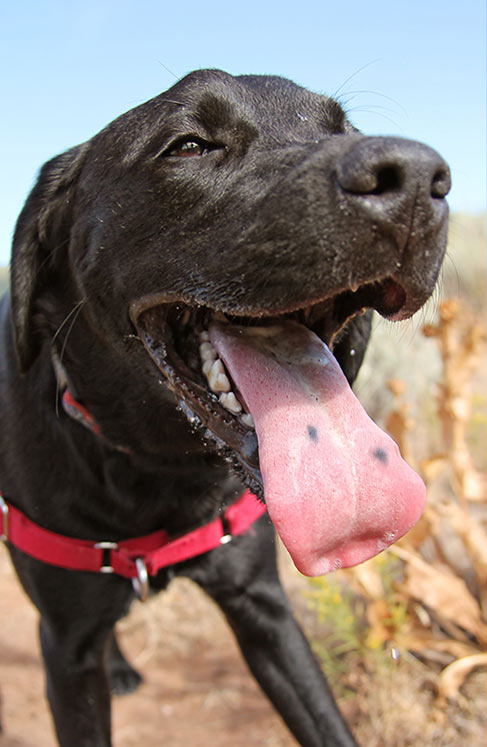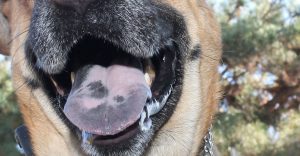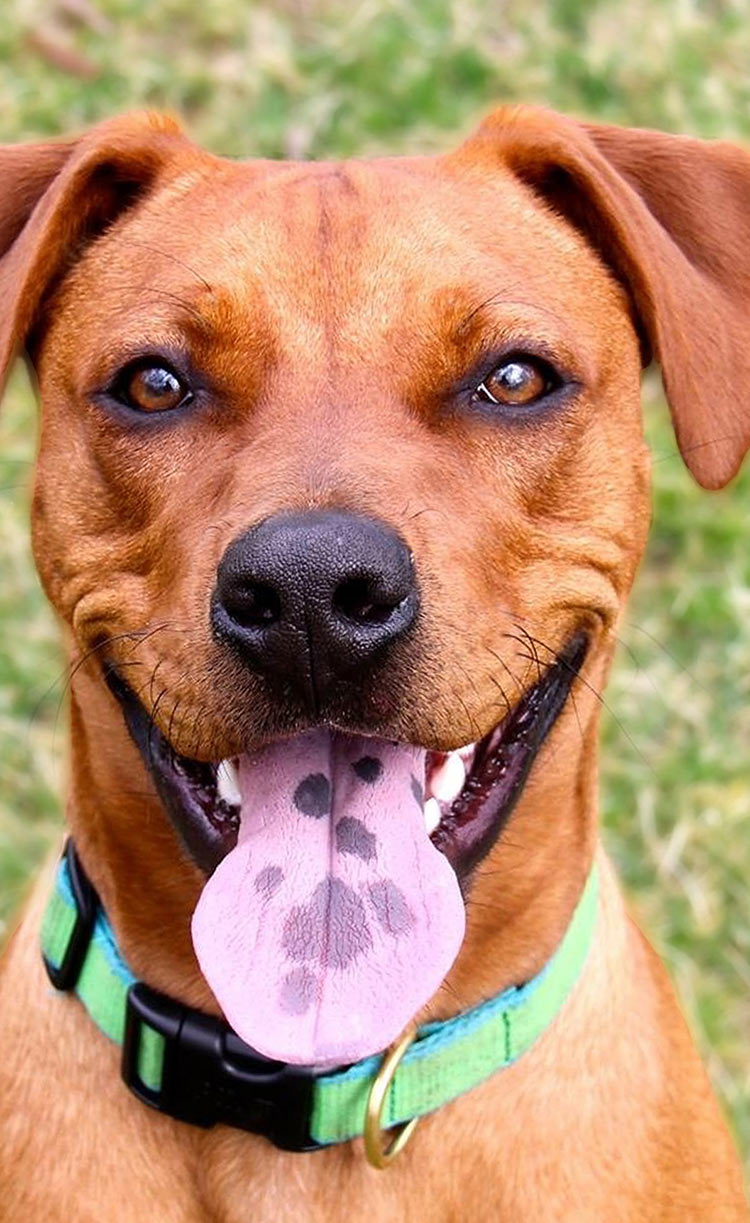A black spot on a dog’s tongue is often nothing to worry about. A single flat dark patch or several freckle like splatters of black, are common in some breeds. These spots are normally just a part of the coloring or pigmentation that they were born with. Just like the shade of their fur, paws, nose and eyes. It doesn’t mean that there was a Chow in your dog’s family tree or that they are a mixed breed, as many pedigree dogs have black tongue spots. Provided the spots have always been there, and are not raised, changing shape or different in texture from the rest of his tongue, they are harmless. However, new black spots can be a warning sign for a medical problem.
Contents
- What makes a black spot on dog’s tongue?
- Are they rare?
- Dog breeds with black tongues
- Normal vs cancerous canine tongue markings
Why do dogs have black spots on their tongue?
Common belief is that a black spot on dogs’ tongues is a sure sign that they are a cross-breed. This is absolutely not true and there are many pure-bred dogs with spotted tongues.
Most dogs have mostly pink tongues and pink gums. The exception are Chow Chow’s and Chinese Shar-pei’s, where the blue-black tongue is a breed standard. For this reason many people believe that a black spot on dogs’ tongues is a sign that they are a chow mix. This is simply not true.
The black spots or patches are simply pigmentation in the skin of the dog’s tongue. The pigmentation depends on where melanin is deposited. Melanin is the pigment responsible for coloring in living creatures. Skin, hair, nails, nose, eyes, mouth – and also the tongue. So a black spot on a dog’s tongue is similar to your own birthmarks or freckles. It’s simply one of your furry friend’s unique inborn characteristics.

How common are dogs with spotted tongues?
Black spots on the tongues of usually pink tongue dog breeds are not actually that rare. They have a genetic link, just like the color of their coat. A dog with a patch or black spot on their tongue is quite likely have a parent or a grandparent with the same characteristic. But it isn’t a given, and tongue spots may appear in a dogs whose ancestors were spot-free.
While science has determined that genetics determines melanin deposits, they haven’t established exactly how the mechanism of inheritance works in the the case of tongue spots. We do know that spotted tongues are more common in those breeds that have darker “points” – their lips, nose, eye rims, paw pads and toenails. So certain breeds are more likely to have dogs with spotted tongues.
Dog breeds with black spots on tongue
A black spot on dogs’ tongues actually occurs regularly in over thirty different dog breeds. This includes the purebred or mixed Labrador, Golden Retriever, German Shepherd, Cocker Spaniel, Collie, Siberian Husky, Pug, and Airedale.
What do normal black spots on dogs’ tongues look like?
Inherited black spots on dogs’ tongues are present at birth or develop soon thereafter. And they have the same texture as the rest of the tongue. There could be one tiny spot or many spots on the tongue. They might even cover almost the whole tongue. They could be well defined separate spots, or patches of color.
The color can range from grey or bluish-black to black. It’s also quite normal if the color, and even the shape, changes gradually over time. Just like hair changes color and becomes grey with age. However, the sudden appearance of a black spot on dogs’ tongues is cause for concern. Or if their whole tongue changes colour.

Sudden black spot on dog’s tongue
Your dog’s tongue can be a good indicator to his overall health. Any changes that were not there before could be a sign of an illness and should be checked out by your vet. If your adult dog gets a black spot on their tongue that wasn’t there before, or if there is a change in the appearance or texture of existing black spots, this could be a melanoma.
While cancerous melanomas in dogs are rare, the mouth is the most common place for them to occur. The spot is usually raised and unusually smooth and shiny. Other signs are foul smelling breath and bleeding from the mouth. There is also a disease in dogs called black tongue. Signs are a black tongue, foul smelling breath, redness and ulceration in the mouth, and visible blood in their saliva.
A deficiency of a vitamin called niacin is usually the cause and this illness can be fatal if not treated properly by a vet. If your dog’s tongue has an overall bluish color it can be a sign that he’s not getting enough oxygen. The cause can be a lung disease, heart disease or even exposure to a toxic substance.
Regular dental checks with your vet will help highlight any problems with your dog’s mouth and tongue. In the meantime, always consult your vet about any changes in your dog’s mouth. Your vet won’t mind if there’s nothing wrong. Problems spotted early on are much easier to treat.
The Labrador Site Founder
Pippa Mattinson is the best selling author of The Happy Puppy Handbook, the Labrador Handbook, Choosing The Perfect Puppy, and Total Recall.
She is also the founder of the Gundog Trust and the Dogsnet Online Training Program
Pippa's online training courses were launched in 2019 and you can find the latest course dates on the Dogsnet website




















My shih zhu had one black spot in his tongue now he has several more. Is this something to worry about?
Hi Barbara, Although it could be natural markings I would give your local veterinarian a ring, and book an appointment or sending them across some photographs, just to be on the safe side. Best wishes!
Rescued a lab puppy that someone dumped on the side of the road by my house several months ago. Shes probably about 8 or 9 months old. And is the most stubborn dog Ive ever seen!!! She listens to nothing. And only goes outside to ay instead of doing her business!!! Ive never had this much problem training a dog!!!
HELP!!! Al Faivre
My staffy x lab who is 10, developed a black tongue spot at the age of about 2 years old. About 1 month ago he yawned and I realised it had disappeared!!! Weird!!! He now has the pink tongue he had when he was a pup!!! Very weird!
My son’s dog has an all black tongue.he is a mixed breed,lab,Shepard and pit.he is 4yrs old and and great dog.is this something I should worry about since it covers the whole tongue?
Our lab doesn’t bark, is this normal in some labs. He is almost 8 yrs old. He has maybe barked 6 times.
Carolyn
What breed is the red dog? My dog that I adopted from a shelter looks exactly like it
It’s a Rhodesian Rigdgeback they are a powerful hound that uses scent to track prey.
My lab Delaney had 2 black spots one in the centre near the front and one further back which you only really saw after he’d been chasing his ball and he was worn out needing a drink lol
My 8 month old lab cross has developed bluish black spots on his tongue that I am sure were not there when we got him at 6 weeks old. He’s a very healthy pup and the spots aren’t raised or anything, but seeing them gave me cause for concern
We got our Sadie Sue, Lab Sheherd (NOT CHOW!) Mix, 12 and a half years ago when she was six months. (we had her 13th b’day cake last week) she is nearing the end of her long happy busy life and just today on this site I discovered that, black spotted tongue and all, she has NO Chow in her! Holy cow! She has been my best friend – and shadow- for many lovely years!
My chocolate lab mix, 8 mos, has not barked since I adopted her 3 1/2 months ago. Does that mean she can’t bark? She is very submissive, afraid of everything, even me after 3 1/2 months. I wouldn’t hurt an animal for all the money in the world. Please answer me on e-mail.
My pedigree field black lab has a black tongue spot quite far back on one side, she has a matching black spot in her ear on the same side. I like them as a little quirk of her and also a “Lassie” style way of identifying her if her legal “owner” was ever in question (she’s chipped, but I like the idea of dramatically proving she’s mine by my knowledge of her hidden anatomy lol)